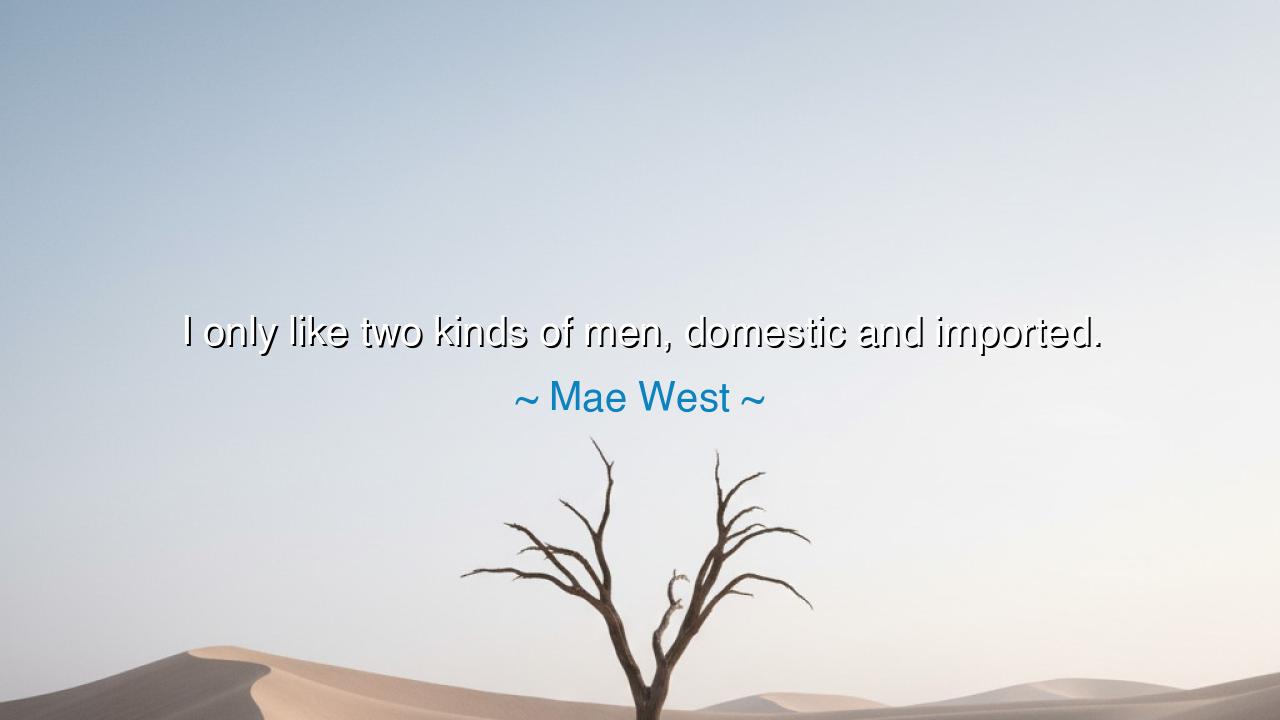
I only like two kinds of men, domestic and imported.






The words of Mae West, “I only like two kinds of men, domestic and imported,” may seem like a playful jest — a quip designed to provoke laughter — but beneath its glittering humor lies the profound wisdom of a woman who understood freedom, desire, and self-sovereignty in an age that sought to confine women’s voices. In her time, the early decades of the twentieth century, women were expected to be modest, silent, and obedient. West shattered that silence with wit sharp as steel and charm bold as flame. Her humor was not mere jest; it was rebellion dressed in silk. Through laughter, she claimed her right to choose, to desire, to live as she pleased.
At its heart, the quote celebrates the independence of female will. When Mae West declares she likes all men — “domestic and imported” — she mocks the divisions that society creates between the familiar and the foreign, the acceptable and the forbidden. Her words proclaim that a woman’s taste, like her spirit, should not be constrained by boundaries, whether social, moral, or national. It is a philosophy of abundance: the belief that life is meant to be savored, not restricted. To the ancients, such a soul would have been likened to Aphrodite herself, the goddess of love, who saw beauty in all forms and refused to be limited by mortal codes of propriety.
West’s humor also conceals a deeper defiance against patriarchal judgment. In an era when men freely boasted of their conquests while women were condemned for the same, she turned the weapon of wit back upon her critics. By treating desire lightly, she robbed it of its power to shame. Like a philosopher disguised as a comedienne, she taught that self-confidence is the purest armor. Her laughter was her sword; her sensuality, her banner. In this way, she reminds us that wit is not only a tool of amusement but also a shield of dignity and a flame of freedom.
Consider how her spirit mirrors that of Cleopatra, the Egyptian queen who, centuries before, refused to be defined by the judgments of others. Cleopatra ruled with allure and intelligence, commanding both Caesar and Antony, not through submission but through the strength of her personality. Both women understood a timeless truth — that charisma, when born of self-knowledge, becomes power. Mae West, too, ruled her world not from a throne but from a stage, her laughter shaking the walls of convention.
The quote, though light in tone, carries an unspoken lesson about the universality of attraction and human connection. It teaches that love and fascination transcend categories and borders — that the human heart recognizes beauty wherever it exists. In this way, West’s jest is also a parable of inclusion: the world is richer when one embraces its diversity. In every face, in every culture, there lies a reflection of something we desire or admire. To limit our hearts is to live half a life.
But there is yet another layer — a reflection on aging, independence, and joy. Mae West remained a symbol of glamour well into her later years, refusing to retreat from the stage of life. Her wit never grew dull because it came not from vanity but from vitality. She embodied the ancient ideal that to live fully is the truest art. Her humor reminds us that even in jest, one may speak sacred truths — that laughter can be a hymn to liberty.
So what lesson should we draw, O listener? It is this: live with boldness. Desire without shame, speak without fear, and laugh without apology. The world will try to define your worth — by age, by gender, by origin — but your spirit must remain your own. Like Mae West, claim joy as your birthright. Love the “domestic and the imported,” not only in people but in experiences, ideas, and dreams. For the heart that welcomes the vastness of the world will never grow small, and the soul that laughs at limits will never grow old.






AAdministratorAdministrator
Welcome, honored guests. Please leave a comment, we will respond soon